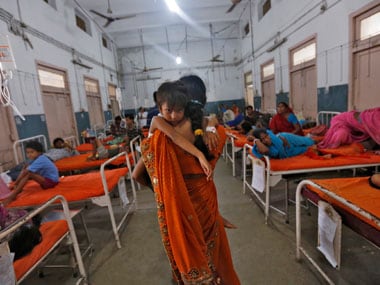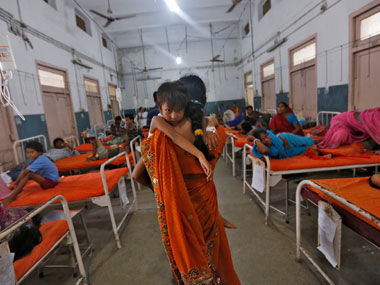Ministry of AYUSH — Ayurveda, Yoga and Naturopathy, Unani, Siddha and Homeopathy — on Friday opened centres for Unani and Siddha medicine at the Safdarjung Hospital in south Delhi. This is the third major government hospital in the Capital to get centres for traditional medicine: the Central Council for Research in Unani Medicine also runs Unani centres at New Delhi’s Ram Manohar Lohia Hospital and Deen Dayal Upadhyay Hospital, respectively. [caption id=“attachment_3476282” align=“alignleft” width=“380”]  Representational image. Reuters[/caption] Unani and Siddha are traditional systems of medicine that fell out of favour in modern times. Each has its own history and methods. Without delving into the efficacy of either, here’s a quick look at what each of these systems is about.
Unani
Originally from Greece, the system came to India through the Middle East sometime in the 11th century. Unani is based on the “four humours” theory of Greek physician Hippocrates (you’ve probably heard of the Hippocratic Oath that all doctors take to this day). According to the Unani system, the body is made up of seven components: elements (air, water, earth, fire), temperament, humours, organs, spirit, faculties and functions. The humours — blood, phlegm, yellow bile and black bile — manage bodily processes like digestion, growth, repair and preservation of life. Faculties include three powers: the natural power of the body to digest food for energy, psychic power belongs with the brain and central nervous system and, finally, vital power — seated in the heart — keeps all the organs alive and functioning. Based on the severity of the disease, the Unani system has treatments from dietary restrictions to non-invasive procedures, medicines and surgery. Unani doctors depend on the patient’s pulse, and if required, an examination of their urine and stool, to make a diagnosis. Unani medicine focuses as much on preserving health as treating diseases. There are recommendations within the system for keeping air and water pollution-free, for eating fresh food, for regular exercise and rest, and for maintaining proper bowel movement.
Siddha
Siddha is an ancient South Indian system of medicine. Thought to have originated around the 4th century, the Siddha system is based on an understanding of metals and minerals as well as chemical processes such as distillation, fusion, fermentation, purification, liquefication and extraction. In a 2001 article, B.V. Subbarayappa, then a visiting professor at the National Institute of Advanced Studies, Bangalore, and an authority on the history of traditional Indian medicine, explained that the Siddha system was inspired by Chinese alchemy, and depended heavily on the use of mercury and its compounds. Its aim: “to attain immortality or ‘deathlessness’ of human body in contradistinction to Ayurveda and Unani which at best attempt to rejuvenate and prolong human life, accepting the inevitable death of the body”, he wrote in “The roots of ancient medicine: an historical outline” - published in 2001 in the Indian Academy of Science’s Journal of Biosciences. (Subbarayappa died in April this year, aged 94.) According to the Ministry of AYUSH website, the Siddha system is also similar to Ayurveda in many ways. The idea that the human body is made of five components — earth, water, air, fire and sky — is common to both. Both systems say that food and medicines are also made of these components. “The proportion of the elements present in the drugs vary and their preponderance or otherwise is responsible for certain actions and therapeutic results,” according to the write-up on the website. The Siddha system recommends that a physician check the colour of the skin, eyes and tongue, and examine the urine to check its colour, smell, density, and quantity to gauge the patients’ health. According to experts, there is an emphasis in this system on women’s reproductive health, especially increasing fertility. In 2014, the Modi government instituted the Ministry of AYUSH to revive traditional systems of medicine. Research and clinical trials have now begun - the Central Council for Research in Siddha Medicine launched the second edition of the Journal of Research in Siddha Medicine at the inauguration of the Unani and Siddha centres at Safdarjung Hospital on 13 September. But it is still early days in terms of putting these systems to modern tests. We need many more robust studies that look into their efficacy. Health articles in Firstpost are written by myUpchar.com, India’s first and biggest resource for verified medical information. At myUpchar, researchers and journalists work with doctors to bring you information on all things health. To read in-depth articles on every type of medical condition, please visit https://www.myupchar.com/en/disease


)

)
)
)
)
)
)
)
)



